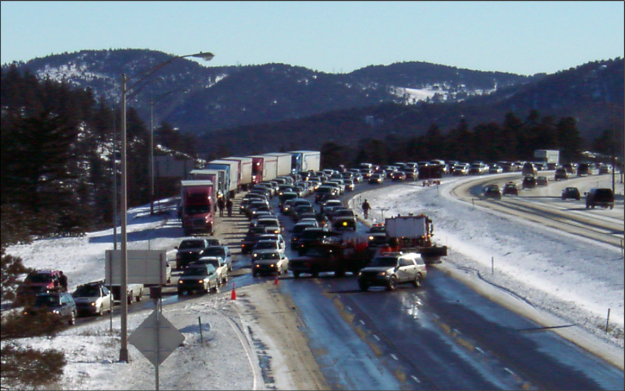Widgetized Section
Go to Admin » Appearance » Widgets » and move Gabfire Widget: Social into that MastheadOverlay zone
I-70 tire traction bill passes House on voice vote

Scenes like this were far too common last winter along I-70 in Colorado. Lawmakers are debating how best to deal with the situation (I-70 Coalition photo).
A day after another series of weather-related closures on Interstate 70, a bill to clarify Colorado’s tire-chain law gained traction Thursday with a voice vote of approval in the state House.
Sponsored by Rep. Diane Mitsch Bush, a Democrat who represents Vail and surrounding Eagle County, HB15-1173 specifies that between Nov. 1 and May 15 passenger vehicles traveling between Morrison and Dotsero on I-70 “must have adequate tread depth on their tires or carry chains or other traction devices.”
The I-70 tire traction bill clarifies the current chain law, which provides for fines ranging from $100 to $500 for anyone who causes an accident or closes the highway when the chain law is in effect. The new bill clarifies that passenger vehicles, not just commercial trucks, are subject to the same fines.
It would not create traction checkpoints or any new fines.
Mitsch Bush, a Democrat who also represents Routt County – home to Steamboat Springs ski area – said her bill isn’t just about keeping skier traffic flowing.
“For energy, for agriculture, for folks who are trying get to medical appointments who live on the Western Slope and don’t have those facilities and need to get to Denver, or to its suburbs, I-70 is the lifeline, not just for Western Colorado, but indeed for our whole state,” Mitsch Bush said last week when the bill passed out of the House Transportation & Energy Committee.
The committee’s vote last week was 8-5, with Rep. Don Coram, R-Montrose, joining the seven-member Democratic majority. The bill is co-sponsored by Rep. Bob Rankin, R-Carbondale.
Mitsch Bush did acknowledge lost tourism revenue is a major driver of the legislation.
“This bill is not just a public safety measure,” she said. “It will reduce economic losses that cost our state an estimated $143 million in 2014.”
Vail Mayor Andy Daly and Colorado Ski Country USA President and CEO Melanie Mills, in an article that ran on Government Executive State & Local last fall, both called for extraordinary measures to prevent the kinds of traffic snarls that plagued I-70 last ski season:
VAIL, Colo. — Last spring the mayor of this glitzy ski town high in the Colorado Rockies wondered aloud, after a particularly brutal winter wreaked havoc on the local interstate, whether guests from New York, Dallas and Chicago would keep flocking to the slopes if they encountered big-city traffic once they arrived.
“I think that’s going to begin to hurt Colorado as people look to places that have a great lifestyle and part of that lifestyle is easy access to recreation,” Vail Mayor Andy Daly said. “We’ve got some vulnerability, and if we don’t address Interstate 70, it’s going to be just another competitive disadvantage for Colorado as it tries to compete with the likes of Utah.”
The 100-mile stretch of I-70 between Denver and Vail rises from 5,280 feet and travels west over two high-mountain passes in excess of 10,000 feet. It’s Colorado’s main east-west portal to its $2 billion ski industry, but also a critical interstate trucking route—one that completely shuts down up to 50 times a winter.
One snowy Sunday afternoon in February, drive times that average two hours in decent conditions ballooned to nine hours because of spun-out passenger vehicles and jackknifed semis. Daly noted it took him nearly as long to drive from Denver to Vail as it did to fly from Denver to a ski area in France.
Daly and other local and state politicians say it’s time to seriously consider a commercial trucking ban during peak ski-traffic periods such as Friday and Sunday afternoons, an idea that has the state’s powerful trucking lobby girding for battle.
“While the mayor has made the suggestion to bar trucks during those periods, he has not reached out to us to discuss this matter and better understand the challenges that such a proposal creates,” said Greg Fulton, president of the Colorado Motor Carrier’s Association.
“I-70 is not a local or state road, it is a major interstate highway and one of two major primary thoroughfares for goods and equipment as well as imports and exports to and from the coasts,” Fulton added. “Trying to schedule travel across the entire country around various windows of time … would be difficult, if not impossible.”
The Colorado Department of Transportation (CDOT) manages the stretch of I-70 between Kansas and Utah, and would require the approval of the Federal Highway Administration to restrict commercial vehicle traffic during certain periods.
“It’s time to have the truck restrictions conversation we’ve been avoiding in Colorado,” said Melanie Mills, president and CEO of Colorado Ski Country USA, the state’s major ski-industry lobbying group. “Limited truck restrictions have been in place in the Sierras for many years. We think it’s time to take a hard look at whether they could be effective here in Colorado.”


